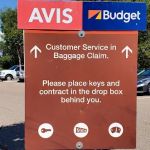
Does Car Rental Insurance Cover Liability?
When renting a car, one of the most common questions renters ask is whether car rental insurance covers liability. Liability coverage is essential for protection in case of accidents, but understanding what is included in your rental agreement can be tricky. In this article, we will clarify whether car rental insurance covers liability, and what steps you can take to ensure you're fully protected during your rental experience.
1. What Is Liability Coverage in Rental Cars?
Liability coverage in car rental insurance refers to the protection that covers bodily injury or property damage caused to others in an accident for which you're at fault. It doesn't cover damages to the rental car itself or injuries to you, the driver. However, it is critical to understand the specifics of this coverage when renting a vehicle, as it varies by rental agency and location.
Liability coverage can be divided into two main categories:
- Bodily Injury Liability: This covers medical expenses, legal fees, and lost wages if the accident causes injury or death to another person.
- Property Damage Liability: This covers repairs or replacement of property (such as other vehicles, fences, or buildings) that you damage during an accident.
2. Does Car Rental Insurance Automatically Include Liability?
While liability insurance is crucial for protection, it is not always automatically included in every car rental agreement. Many rental companies offer what is called a “Collision Damage Waiver” (CDW) or “Loss Damage Waiver” (LDW), which covers damage to the rental vehicle itself, but does not necessarily include liability coverage for injuries or property damage caused to others.
It’s essential to check the details of your rental agreement before signing. Some rental companies may include basic liability coverage, but it could be limited and not enough to fully protect you in the event of a serious accident. For example, some rental contracts may only offer state-mandated minimum liability coverage, which may not be sufficient for serious accidents.
3. How to Get Full Liability Coverage for Rental Cars
If the basic liability coverage provided by the rental agency isn’t enough, there are several ways to ensure that you have full protection:
- Purchase Additional Coverage: Many rental agencies offer the option to purchase supplemental liability insurance (SLI), which extends the liability coverage to a higher limit. This extra protection can give you peace of mind, especially when traveling in unfamiliar areas.
- Check Your Own Auto Insurance: Some personal auto insurance policies extend coverage to rental cars. Before renting a car, contact your insurer to find out whether your existing policy includes liability coverage for rental vehicles. If it does, you may not need to purchase additional coverage from the rental agency.
- Use Credit Card Benefits: Many credit cards offer rental car insurance benefits when you use the card to pay for the rental. This can include liability coverage, but it’s important to read the fine print and confirm that the credit card benefits include adequate liability coverage for your needs.
4. Real-Life Example: Liability Coverage in Action
Let’s look at a real-life scenario to understand the importance of liability coverage. Imagine you're driving a rental car and accidentally hit another vehicle, causing significant damage and injuring the other driver. Without liability insurance, you would be personally responsible for paying for the damage and medical costs, which could amount to thousands of dollars.
Now, if you had purchased the supplemental liability coverage offered by the rental agency, or if your personal auto insurance policy extended liability coverage to rental cars, the rental company’s insurance would cover the damages, sparing you from paying out of pocket. However, if you only had the basic minimum liability coverage required by state law, you might still face significant financial exposure, especially if the damages exceed the coverage limits.
5. Important Tips for Renting a Car and Securing Liability Coverage
To ensure you're fully covered when renting a car, follow these helpful tips:
- Review Your Rental Agreement: Always carefully read the terms of your rental agreement. Pay close attention to what coverage is included and what additional options are available.
- Ask About Liability Limits: If liability coverage is provided, ask about the limits. Ensure that the coverage is sufficient for your needs, especially if you're driving in areas with higher risks of accidents.
- Consider Your Travel Plans: If you're traveling internationally or to areas with higher accident rates, consider purchasing extra coverage for additional peace of mind.
- Use Your Own Insurance or Credit Card Benefits: Check with your insurance provider and credit card company to see if they offer rental car insurance. This can save you money and provide extra coverage.
By taking these steps, you can ensure that you're protected and avoid any unexpected expenses during your trip. For a more seamless car rental experience, consider visiting Carvel Car Rental, where you can find the best car rental deals, services, and coverage options to suit your needs.







 Hertz Car Rental - San Diego - Pacific Beach3.0 (99 reviews)
Hertz Car Rental - San Diego - Pacific Beach3.0 (99 reviews) Hertz Car Rental - Gahanna - North Stygler Hle3.0 (54 reviews)
Hertz Car Rental - Gahanna - North Stygler Hle3.0 (54 reviews) Avis Car Rental3.0 (171 reviews)
Avis Car Rental3.0 (171 reviews) Hertz Car Rental - Dallas - Dallas Fort Worth International Airport (DFW)3.0 (2386 reviews)
Hertz Car Rental - Dallas - Dallas Fort Worth International Airport (DFW)3.0 (2386 reviews) Aventi Exotic Car Rental0.0 (0 reviews)
Aventi Exotic Car Rental0.0 (0 reviews) Budget Car Rental3.0 (41 reviews)
Budget Car Rental3.0 (41 reviews) Do I Need Liability Insurance for Car Rental? Understanding Your Options
Do I Need Liability Insurance for Car Rental? Understanding Your Options Do All Car Rental Companies Require a Deposit? What You Need to Know
Do All Car Rental Companies Require a Deposit? What You Need to Know How Uber Car Rental Works: A Convenient Way to Rent a Car
How Uber Car Rental Works: A Convenient Way to Rent a Car Do Car Rental Companies Charge Per Mile? Everything You Need to Know
Do Car Rental Companies Charge Per Mile? Everything You Need to Know How to Find the Cheapest Car Rental in the US: Insider Strategies
How to Find the Cheapest Car Rental in the US: Insider Strategies Can You Take a Car Rental to Mexico? What You Need to Know
Can You Take a Car Rental to Mexico? What You Need to Know